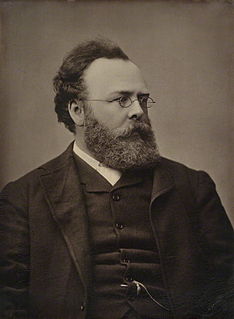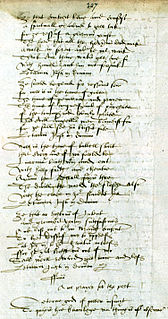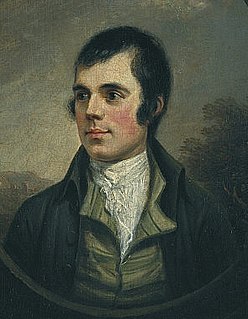
Robert Williams Buchanan was a Scottish poet, novelist and dramatist.

Edwin George Morgan was a Scottish poet and translator associated with the Scottish Renaissance. He is widely recognised as one of the foremost Scottish poets of the 20th century. In 1999, Morgan was made the first Glasgow Poet Laureate. In 2004, he was named as the first Makar or National Poet for Scotland.
The Scottish Renaissance was a mainly literary movement of the early to mid-20th century that can be seen as the Scottish version of modernism. It is sometimes referred to as the Scottish literary renaissance, although its influence went beyond literature into music, visual arts, and politics. The writers and artists of the Scottish Renaissance displayed a profound interest in both modern philosophy and technology, as well as incorporating folk influences, and a strong concern for the fate of Scotland's declining languages.
Sydney Goodsir Smith was a New Zealand-born Scottish poet, artist, dramatist and novelist. He wrote poetry in literary Scots often referred to as Lallans, and was a major figure of the Scottish Renaissance.

Violet Jacob was a Scottish writer known especially for her historical novel Flemington and for her poetry, mainly in Scots. She was described by a fellow Scottish poet Hugh MacDiarmid as "the most considerable of contemporary vernacular poets".

A makar is a term from Scottish literature for a poet or bard, often thought of as a royal court poet.
Tom Leonard was a Scottish poet, writer and critic. He was best known for his poems written in Glaswegian dialect, particularly his Six Glasgow Poems and The Six O'Clock News. His work frequently dealt with the relationship between language, class and culture.
Liz Lochhead Hon FRSE is a Scottish poet, playwright, translator and broadcaster. Between 2011 and 2016 she was the Makar, or National Poet of Scotland, and served as Poet Laureate for Glasgow between 2005 and 2011.
Helen Burness Cruickshank was a Scottish poet and suffragette and a focal point of the Scottish Renaissance. Scottish writers associated with the movement met at her home in Corstorphine.

Jacqueline Margaret Kay,, is a Scottish poet, playwright, and novelist, known for her works Other Lovers (1993), Trumpet (1998) and Red Dust Road (2011). Kay has won many awards, including the Guardian Fiction Prize in 1998 and the Scottish Mortgage Investment Trust Book of the Year Award in 2011.
David Daiches was a Scottish literary historian and literary critic, scholar and writer. He wrote extensively on English literature, Scottish literature and Scottish culture.

Helen Adam was a Scottish poet, collagist and photographer who was part of a literary movement contemporaneous to the Beat Generation that occurred in San Francisco during the 1950s and 1960s. Though often associated with the Beat poets, she would more accurately be considered one of the predecessors of the Beat Generation.

Christopher Whyte is a Scottish poet, novelist, translator and critic. He is a novelist in English, a poet in Scottish Gaelic, the translator into English of Marina Tsvetaeva, Pier Paolo Pasolini and Rainer Maria Rilke, and an innovative and controversial critic of Scottish and international literature. His work in Gaelic appears under the name Crìsdean MacIlleBhàin.
Robert Crawford is a Scottish poet, scholar and critic. He is currently Professor of English at the University of St Andrews.
Margery Greenshields Palmer McCulloch was a Scottish literary scholar, author and co-editor of the Scottish Literary Review.
Marion Emily Angus (1865–1946) was a Scottish poet who wrote in the Scots vernacular or Braid Scots, defined by some as a dialect of English and others as a closely related language. Her prose writings are mainly in standard English. She is seen as a forerunner of a Scottish renaissance in inter-war poetry – her verse marks a departure from the Lallans tradition of Robert Burns towards that of Hugh MacDiarmid, Violet Jacob and others.

Poetry of Scotland includes all forms of verse written in Brythonic, Latin, Scottish Gaelic, Scots, French, English and Esperanto and any language in which poetry has been written within the boundaries of modern Scotland, or by Scottish people.
Marion Bernstein (1846–1906) was a radical feminist poet who lived most of her life in Glasgow.

Scots-language literature is literature, including poetry, prose and drama, written in the Scots language in its many forms and derivatives. Middle Scots became the dominant language of Scotland in the late Middle Ages. The first surviving major text in Scots literature is John Barbour's Brus (1375). Some ballads may date back to the thirteenth century, but were not recorded until the eighteenth century. In the early fifteenth century Scots historical works included Andrew of Wyntoun's verse Orygynale Cronykil of Scotland and Blind Harry's The Wallace. Much Middle Scots literature was produced by makars, poets with links to the royal court, which included James I, who wrote the extended poem The Kingis Quair. Writers such as William Dunbar, Robert Henryson, Walter Kennedy and Gavin Douglas have been seen as creating a golden age in Scottish poetry. In the late fifteenth century, Scots prose also began to develop as a genre. The first complete surviving work is John Ireland's The Meroure of Wyssdome (1490). There were also prose translations of French books of chivalry that survive from the 1450s. The landmark work in the reign of James IV was Gavin Douglas's version of Virgil's Aeneid.
Marijane Osborn is an American academic. Her research spans literary disciplines, she is a specialist in Old English and Norse literature, and she has published on runes, Middle English, Victorian and contemporary poets and writers, film, and is a translator and fiction writer. She is Professor Emerita at UC Davis.








